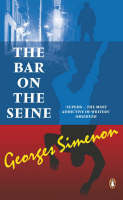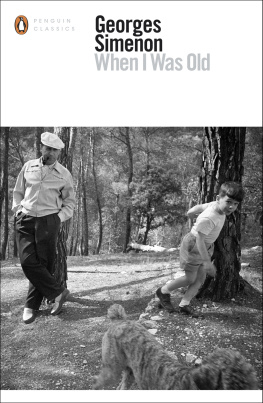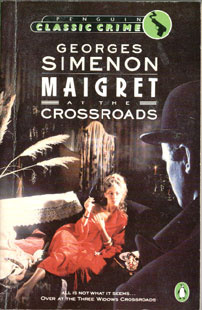Georges Simenon - Maigret and the Toy Village
Here you can read online Georges Simenon - Maigret and the Toy Village full text of the book (entire story) in english for free. Download pdf and epub, get meaning, cover and reviews about this ebook. year: 1979, publisher: Harcourt Brace Jovanovich, genre: Detective and thriller. Description of the work, (preface) as well as reviews are available. Best literature library LitArk.com created for fans of good reading and offers a wide selection of genres:
Romance novel
Science fiction
Adventure
Detective
Science
History
Home and family
Prose
Art
Politics
Computer
Non-fiction
Religion
Business
Children
Humor
Choose a favorite category and find really read worthwhile books. Enjoy immersion in the world of imagination, feel the emotions of the characters or learn something new for yourself, make an fascinating discovery.
- Book:Maigret and the Toy Village
- Author:
- Publisher:Harcourt Brace Jovanovich
- Genre:
- Year:1979
- Rating:3 / 5
- Favourites:Add to favourites
- Your mark:
- 60
- 1
- 2
- 3
- 4
- 5
Maigret and the Toy Village: summary, description and annotation
We offer to read an annotation, description, summary or preface (depends on what the author of the book "Maigret and the Toy Village" wrote himself). If you haven't found the necessary information about the book — write in the comments, we will try to find it.
Maigret and the Toy Village — read online for free the complete book (whole text) full work
Below is the text of the book, divided by pages. System saving the place of the last page read, allows you to conveniently read the book "Maigret and the Toy Village" online for free, without having to search again every time where you left off. Put a bookmark, and you can go to the page where you finished reading at any time.
Font size:
Interval:
Bookmark:
Maigret and the ToyVillage
Flicie est l
the 46th episode in the Maigret Saga
1944
Georges Simenon
translated by Eileen Ellenbogen
3S XHTML edition 1.0
Contents
A Helen and Kurt Wolff Book
Harcourt Brace Jovanovich
New York and London
Copyright 1944 by Editions Gallimard
English translation copyright 1978 by Georges Simenon
All rights reserved. No part of this publication may be reproduced or transmitted in any form or by any means, electronic or mechanical, including photocopy, recording, or any information storage and retrieval system, without permission in writing from the publisher.
Printed in the United States of America
LIBRARY OF CONGRESS CATALOGING IN PUBLICATION DATA
Simenon, Georges, 1903-1989 Maigret and the toy village.
Translation of Flicie est l. A Helen and Kurt Wolff book.
I. Title.
PZ3.S5892Maegwn [PQ2637.I53] 843'.9'12 79-1843
ISBN 0-15-155554-0
First American edition 1979
1
Peg Legs Funeral
It probably did not last more than a second, but the impression it made upon Maigret was quite extraordinary. It was like one of those dreams that, we are told, pass in a flash but seem to go on forever. Years later, Maigret could still have pointed to the exact spot where it happened, the paving stone on which he had been standing, the stone wall on which his shadow had been projected. He would be able to remember not only every detail of the scene, but also the various smells in the air and the feel of the breeze, all of which vividly recalled his childhood.
It was the first time that year that he had ventured out without his overcoat, his first sight of the countryside at ten oclock in the morning. Even his pipe, an unusually large one, seemed to taste of spring. There was a lingering nip in the air. Maigret walked along with a heavy tread, his hands in his trouser pockets. Flicie walked beside him, or, rather, a little ahead of him, since in order to keep up with him, she had to take two steps for every one of his.
Together, they drew level with a brand-new building of pink brick. In the window were displayed a few vegetables, two or three cheeses, and a string of blood sausages on a ceramic plate.
Flicie quickened her step, stretched out her hand, and pushed open the glass door of the shop. And it was then, evoked, no doubt, by the sound of the bell, that Maigret experienced the sensation that he was never to forget.
The shop bell was no ordinary bell. A cluster of thin metal tubes was suspended above the door, which, when opened, created a draft that caused the tubes to collide and emit a carillon of tinkling chimes.
Long ago, in Maigrets childhood, the pork butcher in his home village had completed the redecoration of his shop by installing just such a carillon.
And this was why, at this moment, for Maigret the present seemed suddenly in abeyance. How long this feeling lasted it was impossible to tell, but while it did, Maigret was genuinely transported to another time and place. It was as if he no longer inhabited the body of the thickset Chief Superintendent obediently trailing along behind Flicie.
The long-lost village boy, it seemed, was there on the spot, hiding somewhere, invisible, looking on, with laughter bubbling up inside him.
Well, really! It was all too ridiculous, wasnt it? Could anything be more out of place than that solemn, bulky figure of a man in the company of that caricature of a woman out of a childrens book wearing that absurd red hat? And in such surroundings, too, flimsy and insubstantial as a toy village.
What was he doing there? Conducting an inquiry? Investigating a murder? Here and now, among brick cottages, pink as sugared almonds, with the air full of the twittering of small birds, the fields sprouting tender young green shoots, buds bursting into bloom all over the place, and even the leeks in the shopwindow looking as pretty as flowers?
Yes, he was often to recall this moment in the years to come, and not always with equanimity. For years and years afterward, one or other of his colleagues at the Quai des Or-fvres would pick on a brisk spring morning to remark, half seriously, half teasingly:
I say, Maigret
What is it?
Flicie is here!
And he could almost imagine her standing there, with her slim figure, her quaint clothes, her big blue eyes, her supercilious nose, and, above all, her hat, that outrageous scarlet confection, perched on the top of her head and trimmed with a stiff, iridescent green feather.
Flicie is here!
Grrr! It was well known that the name Flicie had only to be spoken for Maigret to growl like a bear. And this was not to be wondered at, since Flicie had given him more trouble than all the hardened criminals brought to justice by the Chief Superintendent in his long career.
On this particular May morning, Flicie really was there, standing at the door of the little grocers shop. The sign, mlanie chochoi, picire , in yellow lettering, was just legible beneath a couple of transparent stickers advertising a brand of starch and a metal polish. Flicie stood waiting for the Chief Superintendent to be so obliging as to rouse himself from his reverie.
At long last, he stirred, found himself back in the real world, and gathered up the threads of his inquiry into the murder of Jules Lapie, nicknamed Peg Leg.
Her sharp features overspread with an expression of mingled hostility and irony, Flicie was braced to meet his questions, as she had been since early that morning. Behind the counter stood Mlanie Chochoi, a pleasant little woman, with hands folded on a bulging stomach, contemplating the Chief Superintendent of the Police Judiciaire and Peg Legs servant. And a very odd couple they must have seemed to her.
Maigret, puffing gently at his pipe, looked about him. His eyes wandered from the cans of food on the shelves to the unfinished street beyond the glass door, with its newly planted, spindly little trees. Taking his watch from his waistcoat pocket, he finally murmured, with a sigh:
You came in here at a quarter past ten, I think you said? Thats right, isnt it? How can you be so sure about the time?
Flicies lips twitched in a little patronizing smile.
Come over here, she said.
He went across to her, and she pointed to the room behind the shop, which served as a kitchen for Mlanie Chochoi. In the dim interior could be seen a cane armchair, on which lay a ginger cat rolled up in a ball on a red cushion, and just above it, on a shelf, an alarm clock with the hands standing at ten-seventeen.
Flicie had been right. She always was. As for the little shopkeeper, she was wondering what on earth these people had come for.
What did you buy?
A pound of butter. Give me a pound of butter, please, Madame Chochoi. The Chief Superintendent wishes me to do exactly as I did the day before yesterday. Now then, demi-sel next, wasnt it? And then let me think A package of pepper, a can of tomatoes, and two cutlets Put them in my string bag, will you?
Everything seemed strange to Maigret that morning. He could not shake off the feeling that he was as out of place in this little world as a giant in a toy village.
A few miles from Paris, he had diverged from the route along the Seine. At Poissy, he had climbed the hill, and then suddenly, surrounded by real fields and orchards, there before him was this isolated little community. Its name, proclaimed a signboard beside the newly built road, was jeanneville estate .
A few years earlier, this must have been an area of fields, meadows, and thickets, like the surrounding countryside, until the advent of a property developer with a wife or mistress named Jeanne, after whom, no doubt, this embryo village had been named.
Next pageFont size:
Interval:
Bookmark:
Similar books «Maigret and the Toy Village»
Look at similar books to Maigret and the Toy Village. We have selected literature similar in name and meaning in the hope of providing readers with more options to find new, interesting, not yet read works.
Discussion, reviews of the book Maigret and the Toy Village and just readers' own opinions. Leave your comments, write what you think about the work, its meaning or the main characters. Specify what exactly you liked and what you didn't like, and why you think so.












